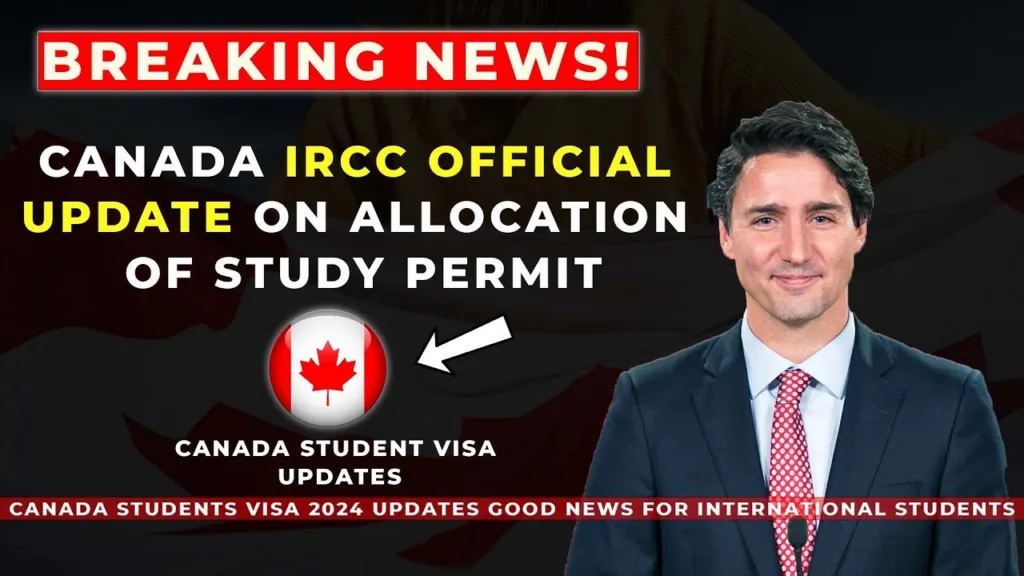SHORTLIST
WATCH LATER
Statement: “On January 22, I announced a national cap on study permit applications to address the rapid increase of international students in Canada. Provincial and territorial allocations for 2024 have now been finalized. I would like to take this opportunity to share those figures and explain how we made these decisions” (Marc Miller).
On 5 April, Marc Miller, the Minister of Immigration, Refugees and Citizenship of Canada made the above statement in Ottawa. Below are the highlighted parts of the statement:
- Presents “Net zero first year growth model”.
- Presents the “Finalize provincial and territorial allocations model”.

Detailed review
First year net zero growth model
- The number of study licenses that are expiring this year determines the national cap. Thus, the number of foreign students expected to enroll in Canadian universities in 2024 should equal the number of students whose visas expire this year. The goal is 485,000 authorized study permits by 2024.
- Every year, about 20% of students apply for an extension and decide to stay in the nation. Thus, the IRCC lowered the aim to 364,000 approved study permits in 2024 by deducting that number (97,000) from the 485,000 target and adding a small reserve to account for other variances.
- Depending on the national acceptance rate of 60% for study permit applications, the target of 364,000 approved study permits translates into a maximum of 606,000 study permit applications submitted in 2024.
- Certain overseas students are not subject to the cap, including those pursuing master’s or doctoral degrees as well as students in elementary and secondary education. Based on data from 2023, the IRCC subtracted the projected volume of these groups (140,000) from the target number of accepted study licenses in 2024. This led to a goal of 236,000 authorized study permits by 2024, which translates to about 393,000 applications for study permits to be distributed.
Finalize provincial and territorial allocations model
- IRCC allocated 393,000 study permit applications based on provincial and territorial population shares, resulting in varied student intake changes between 2023 and 2024 across regions.
- Provinces experiencing increased international student intake in 2024 compared to 2023, based on population share, had their allocations adjusted to cap growth at 10% compared to the previous year.
- Adjusted the allocation for provinces experiencing a decrease in international student intake in 2024 compared to 2023, aiming to mitigate the initial negative impact and align with broader regional immigration objectives.
- IRCC boosted allocations for provinces with approval rates below 60%, aiding them in reaching their projected number of approved study permits for 2024.
- Approximately 552,000 study permit applications were allocated nationally, aiming to secure roughly 292,000 approved permits, marking a 28% decrease from 2023 for capped groups.
- Several factors may affect the influx of new international students to Canada in 2024, including unused allocations by provinces, fluctuating approval rates, and potential in-year adjustments.
The Model of Allocation
| SPs Issued (2023) | Distribution by Population Share | ||||||
| Province / Territory | Excluding K-12 + Grad | All Levels of Study | Population Share Footnote1 | PT Allocations | Projected SPs Approved | % Change from 2023 | |
| Alberta | 22,306 | 34,903 | 11.67% | 45,824 | 27,495 | 23% | |
| British Columbia | 60,864 | 101,576 | 13.66% | 53,638 | 32,183 | -47% | |
| Manitoba | 10,155 | 13,848 | 3.62% | 14,215 | 8,529 | -16% | |
| New Brunswick | 6,186 | 10,354 | 2.09% | 8,207 | 4,924 | -20% | |
| Newfoundland and Labrador | 1,290 | 3,218 | 1.35% | 5,301 | 3,181 | 147% | |
| Northwest Territories | 4 | 39 | 0.12% | 471 | 283 | 6968% | |
| Nova Scotia | 8,604 | 13,813 | 2.62% | 10,288 | 6,173 | -28% | |
| Nunavut | 3 | 5 | 0.10% | 393 | 236 | 7753% | |
| Ontario | 239,753 | 291,609 | 38.81% | 152,394 | 91,436 | -62% | |
| Prince Edward Island | 1,336 | 2,115 | 0.44% | 1,728 | 1,037 | -22% | |
| Quebec | 39,663 | 64,044 | 22.34% | 87,722 | 52,633 | 33% | |
| Saskatchewan | 6,569 | 9,990 | 3.07% | 12,055 | 7,233 | 10% | |
| Yukon | 82 | 225 | 0.11% | 432 | 259 | 216% | |
| Total | 404,668Footnote2 | 559,091Footnote3 | 100% | 392,667 | 235,600 | -42% | |
| Allocation After Initial Adjustment | Final Allocation After Top-Ups for PTs with Approval Rate Below 60% | |||||
| Province / Territory | PT Allocations (A) | Projected SPs Approved (B) | % Change from 2023 | Top-Up (C) | Revised PT Allocations with Top-Up (A+C) | Projected SPs Approved (same as B |
| Alberta | 40,894 | 24,537 | 10% | N/A | 40,894 | 24,537 |
| British Columbia | 83,000 | 49,800 | -18% | N/A | 83,000 | 49,800 |
| Manitoba | 15,233 | 9,140 | -10% | 3,420 | 18,652 | 9,140 |
| New Brunswick | 9,279 | 5,567 | -10% | 5,372 | 14,651 | 5,567 |
| Newfoundland and Labrador | 2,365 | 1,419 | 10% | 788 | 3,153 | 1,419 |
| Northwest Territories | 333 | 200 | 4900% | N/A | 333 | 200 |
| Nova Scotia | 12,906 | 7,744 | -10% | 7,472 | 20,378 | 7,744 |
| Nunavut | 333 | 200 | 6567% | N/A | 333 | 200 |
| Ontario | 235,000 | 141,000 | -41% | N/A | 235,000 | 141,000 |
| Prince Edward Island | 2,004 | 1,202 | -10% | 308 | 2,312 | 1,202 |
| Quebec | 72,716 | 43,629 | 10% | 45,202 | 117,917 | 43,629 |
| Saskatchewan | 12,043 | 7,226 | 10% | 3,011 | 15,054 | 7,226 |
| Yukon | 417 | 250 | 205% | N/A | 417 | 250 |
| Total | 486,523 | 291,914 | -28% | 65,572 | 552,095 | 291,914 |
















